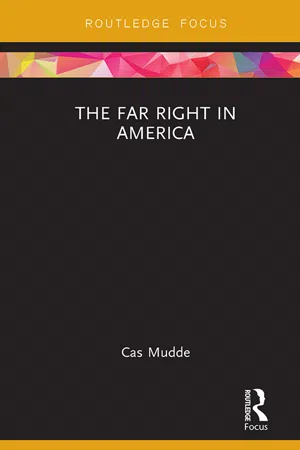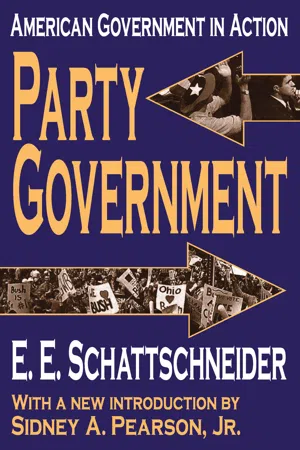Politics & International Relations
Republican Party
The Republican Party is one of the two major political parties in the United States, known for its conservative stance on issues such as limited government, free market capitalism, and traditional values. It has a significant influence on American politics and has produced many prominent leaders, including several U.S. presidents.
Written by Perlego with AI-assistance
Related key terms
Related key terms
1 of 4
Related key terms
1 of 3
4 Key excerpts on "Republican Party"
- eBook - ePub
- Cas Mudde(Author)
- 2017(Publication Date)
- Routledge(Publisher)
11 Is the GOP a far right party?The Republican Party has been categorized as a mainstream, conservative political party for decades. But many of the frontrunners in its 2016 primaries are pushing conservatism to its extremes, making the question of whether the party itself might be(come) far right increasingly relevant.1I know what you are thinking … no, of course not. After all, the Republican Party, or Grand Old Party (GOP), is a party of the right, conservative, but square within the political mainstream. Just because Donald Trump is leading the primaries, and the GOP seems unable and unwilling to stop him, does not make the whole party far right. The official Republican Platform of 2016 is more or less mainstream conservative, as is the (toothless) party leader Reince Priebus. And only a minority of the party’s members of Congress, most notably in the House of Representatives, is ideologically far right – such as Michelle Bachmann (Minnesota), Louie Gohmert (Texas), Steve King (Iowa), and Jeff Sessions (Alabama).The situation is much less clear at the state level, however. Here authoritarianism and nativism run rampant among governors and legislators alike. It is almost exclusively among GOP-controlled states that strict anti-immigration and “anti-Sharia” legislation was introduced. And the vast majority of Republican governors refused to accept Syrian refugees to their state, on the unfounded allegation that they would include terrorists.American parties are not the centralized, homogenous political organizations that European parties are. The particular combination of a first-past-the-post electoral system and extremely expensive campaigns means that individuals can create some independence vis-à-vis national party leaders, particularly if they have their own financial backers or sources. Consequently, the parties are strongly influenced by some individual members, particularly if one of those individuals wins the presidency. In other words, the major presidential candidates play a major role in the (self-)characterization of the party. - eBook - ePub
The political theory of the Irish Constitution
Republicanism and the basic law
- Eoin Daly, Tom Hickey(Authors)
- 2015(Publication Date)
- Manchester University Press(Publisher)
5 in the same manner that every reasonable person elsewhere will wish to be acknowledged as a democrat.In Ireland too, the ‘republican’ idiom has a good deal of local specificity. In political discourse the term has been strongly associated with extra-constitutionalist and violent strands of the nationalist movement. Historically it has been associated less with any distinctive set of ideas concerning social and political organisation than with the various movements prepared to use physical force in the pursuit of national sovereignty and self-determination – from the United Irishmen in the eighteenth century to the Fenians and Irish Republican Brotherhood in the nineteenth, and the Irish Republican Army in the early twentieth century. Garvin has described the Irish republican tradition as ‘nationalist, separatist, vaguely socialist and sometimes Caesaro-papist’.6Certainly, while historical Irish-republican thought was usually more concerned with freedom from external domination than with social and economic conditions, O’Callaghan has argued that its nationalist rhetoric was infused with and borrowed from the classical and the eighteenth-century republican traditions.7Indeed freedom from external rule was explicitly linked with the aim of collective self-government; the 1919 Declaration of Independence affirmed: ‘the Irish people is resolved to secure and maintain its complete independence in order to promote the common weal’.8De Valera’s romantic austerity might seem a departure from bona fide republican thought, yet in fact it echoes some of its historical strands: Rousseau, indeed, celebrated peasant autarky as a social framework for republican virtue.9 - eBook - ePub
The Vanishing Tradition
Perspectives on American Conservatism
- Paul Gottfried(Author)
- 2020(Publication Date)
- Northern Illinois University Press(Publisher)
44 Americans feel a strong emotional connection to their parties, and strongly dislike the opposing party, but these feelings of partisanship are only loosely connected to policy preferences. Instead, we form attachments to parties based on our social group memberships (such as our race and religion), and our parties subsequently become a part of our personal identity. Most Republicans do not support their party because they have strong feelings about the estate tax; they are Republicans because the GOP is the “correct” party for people with their other social identities (white, native born, Christian, etc.). The Republican Party can expect widespread support from a large number of enthusiastic voters, even if those voters have very little interest in conservative public policies per se. This suggests that they are not going to abandon the Republican Party anytime soon, but they may be open to a GOP that stands for something other than conservatism—they may even prefer a less conservative GOP.The existing survey data lead us to conclude that very few Americans are consistent conservatives, at least as the organized conservative movement defines the term. This finding will not surprise scholars of American politics, but many pundits, politicians, and consultants are under the impression that there is a great grassroots army of conservatives and that voters rally around the movement and embrace all of its elements. It is true that more Americans describe themselves as conservative than describe themselves as liberal; this has long been the case. But calling oneself a conservative is not the same thing as endorsing the policy positions pushed by the official voices of the conservative movement. If we use policy preferences as our measure, then we can emphatically declare that most Americans are not conservatives. We can even confidently state that most Republicans are not conservative.This disconnect between the reality of voter preferences and the rhetoric of conservative think tanks, journalists, and advocacy organizations helps us understand why so many leading voices on the right mistakenly declared Trump’s candidacy dead in the water. The truth is that most Republican voters do not insist that candidates pass a specific conservative litmus test. These voters would not personally pass such a test. If there is a conservative consensus, it exists only at the elite level. That being the case, it is clear that elites play a critical role in keeping the Republican Party’s elected officials within conservative boundaries. Republican leaders clearly listen to what the leading voices of the conservative movement have to say, and rely on them when forming policy. - eBook - ePub
Party Government
American Government in Action
- E. Schattschneider(Author)
- 2017(Publication Date)
- Routledge(Publisher)
The mental image behind these declarations is that of a huge association of partisan voters. The Republican Party professes to be an association of all Republicans, i.e., of all partisans who vote for Republican candidates. It follows that these partisans are “members” of the Republican Party. The parties have drawn this portrait of themselves so successfully that assumptions concerning the nature of the parties, wholly unjustified by the facts, have gained general acceptance. One of the incidental consequences of the common notion that the parties are associations of large masses of partisans is that the states have enacted a large body of legislation regulating the internal processes of the parties in the interests of their “members.” This is the surprising aftermath of something that seems to have been originally a mere promotional stunt invented by the party managers to emphasize the devotion of the parties to their followers.It is, however, one thing to be a partisan and another thing to be a member of an association. Let us suppose that the owner of a professional baseball club issued a membership certificate with each ticket sold and that these certificates entitled each “member” of an imaginary association of patrons to buy tickets to all future games and to cheer lustily for the home team. How would the purely promotional “association” so created differ from the Republican and Democratic parties, conceived of as associations of partisans? The concept of membership has doubtless enabled the parties to identify themselves with partisan voters more closely than they might have otherwise, but it has also evoked mental images of parties that are definitely misleading.9As a matter of fact, membership in a political party has none of the usual characteristics of membership in an association. In most states the party has no control over its own membership. Any legal voter may on his own initiative and by his own declaration execute legal formalities before a duly designated public
Index pages curate the most relevant extracts from our library of academic textbooks. They’ve been created using an in-house natural language model (NLM), each adding context and meaning to key research topics.
Explore more topic indexes
Explore more topic indexes
1 of 6
Explore more topic indexes
1 of 4



